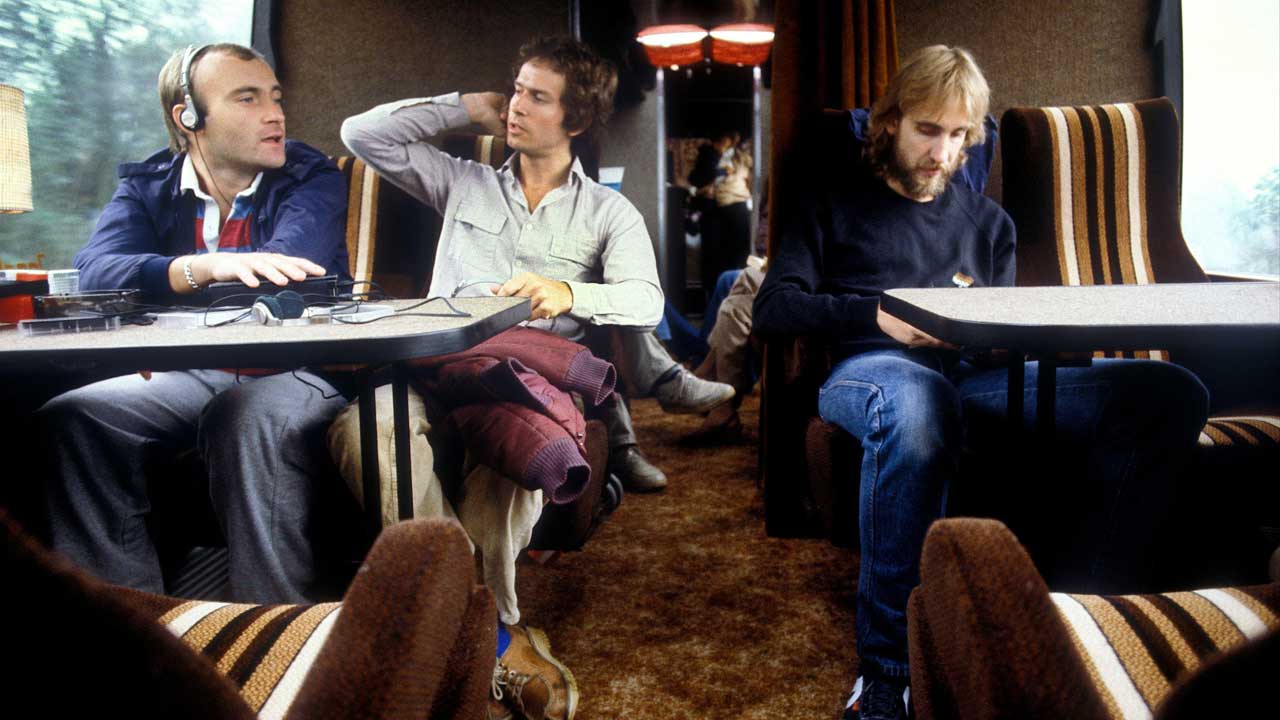‘I’ve been a big Genesis fan ever since the release of their 1980 album Duke. Before that I really didn’t understand any of their work. Too artsy, too intellectual.” - Patrick Bateman in the 1991 novel American Psycho by Bret Easton Ellis.
In the 80s, it’s safe to say, Genesis changed.
“I do feel the strain,” confides Phil Collins, “because it’s said so many times that: ‘The pre-Collins era was the true Genesis’, and: ‘It all fucked up when he started singing.’ Because, really, we all changed. If you stay together as a band, what you wear changes, what you think changes, what you listen to changes, and what you want to do changes. It was a group decision. Well, not even a decision – a metamorphosis.
“Sometimes, when people say: ‘Oh, the early-70s period was better’, that’s because their lives were different in the early 70s. It’s nostalgia for that lived. It was always on the band’s to-do list to have hit singles, to be played on the radio. Even before I joined, that was the premise of the band. I think we got better at knowing when to stop, and when to say, okay, this song sounds great just like this.”

In 1975 the band’s lengthy search for a replacement lead singer after Peter Gabriel departed ended with the post being filled in-house. Phil Collins stepped up to the microphone, still playing drums live during instrumental passages. It worked. Their 1976 album A Trick Of The Tail and the following year’s Wind And Wuthering, the first two of the post-Gabriel era, remain among the band’s best. Genesis had grasped the nettle, and seized victory and longevity from the jaws of fizzling out. They nearly hadn’t, though.
“I remember being in Peter’s hotel room in Manchester when he told me he was going to leave,” Collins recalls 36 years later. “It didn’t occur to me carry on. But my idea of being a four-piece instrumental band went out of the window pretty much that same day. Tony [Banks, keyboards] and Mike [Rutherford, bassist] said: ‘Don’t be ridiculous. We need a singer, because we’re songwriters.’ They didn’t really sing live, and I’d sung all the back-up vocals. Peter and I had become a sort of… Chas & Dave or whatever, and I’d been his stooge on stage. So it became my job to teach the songs to the guys coming to audition. And I always sounded better than them.”
Who decided that?
“Well, I didn’t. This wasn’t something that had entered my head. A Trick Of The Tail was written, and we went into the studio and still didn’t have anybody. We had one guy that we thought might be okay. He came in to sing Squonk, and it wasn’t good. To give the guy credit, nobody in the band had even asked him what key he preferred, if it was too high. We just wrote the music in the key it sounded best in. It was the same with me after I became the singer. No one ever took any notice of what my range was, I had to make do with whatever we’d written.
“So this poor guy left, and we all looked at each other and I said: ‘Well, let me have a go. I think I might be able to do this one.’ I was going to sing a couple of the lighter songs anyway, but nobody knew if I had the balls to sing the heavier stuff. We did it, and it sounded okay. And one by one we just went through it, ticking the songs off the list. As far as I was concerned we’d finished the album, but we still didn’t have a singer. I figured we’d find someone; the album would come out and it would be what it was. In those days, that was sacrosanct – your record was the Holy Grail. What you did live was… as best you could. So we had another half-hearted attempt at finding a singer, but… “
Guitarist Steve Hackett has said he’d pitched his tent ‘firmly in the Phil camp’, after you’d sung on his Voyage Of The Acolyte solo album (1975), and that he and Jon Anderson of Yes encouraged you at your first wedding.
“I’ve read that my first wife suggested I did it, which is quite possible. I may have gone in and said: ‘Well, I guess I’m going to have to do it, as long as I can find a drummer I like.’ And that’s when Bill Bruford came into the picture. But I don’t think anybody thought I’d be able to pull it off. Least of all me.”
“He had a lovely voice,” Tony Banks says of Collins. “He’d obviously done plenty on previous albums. But we weren’t sure he’d want to do it – he was the drummer, after all. And at the time, he didn’t seem to have… the gravitas. But he sounded great. Which meant we had a more difficult decision, in many ways, regarding the live shows, because now we had to look for a drummer as well. So it was two changes where only one had been needed.”
“It was a tall order to ask somebody with real talent to come in and pick up my odds and ends,” says Collins. “I was playing on the records, and also on stage when I wasn’t singing, so to offer a job as a hired hand isn’t normally going to make a great drummer jump up and down with happiness. Bill had played percussion in Brand X with me. We were rehearsing in Shepherd’s Bush one afternoon and he said: ‘Why don’t you ask me?’ He’d been in this area before [musically], with Yes and King Crimson, so he’d be friendly fire to the fans, but I didn’t think he’d do it. For him it was a transitional period, a holding area. Fantastic drummer, but very stubborn and single-minded. I don’t know how happy a time it was for him, but he did it. Then he left and we found Chester Thompson. Bill got us over the bridge.”
Did you get the sense that Genesis fans wanted you to succeed after Peter Gabriel left?
“Coming from our underdog position, when nobody expected anything, A Trick Of The Tail was a bright light. Yes, they wanted the band to survive. And they preferred that we’d made it work within ourselves.”
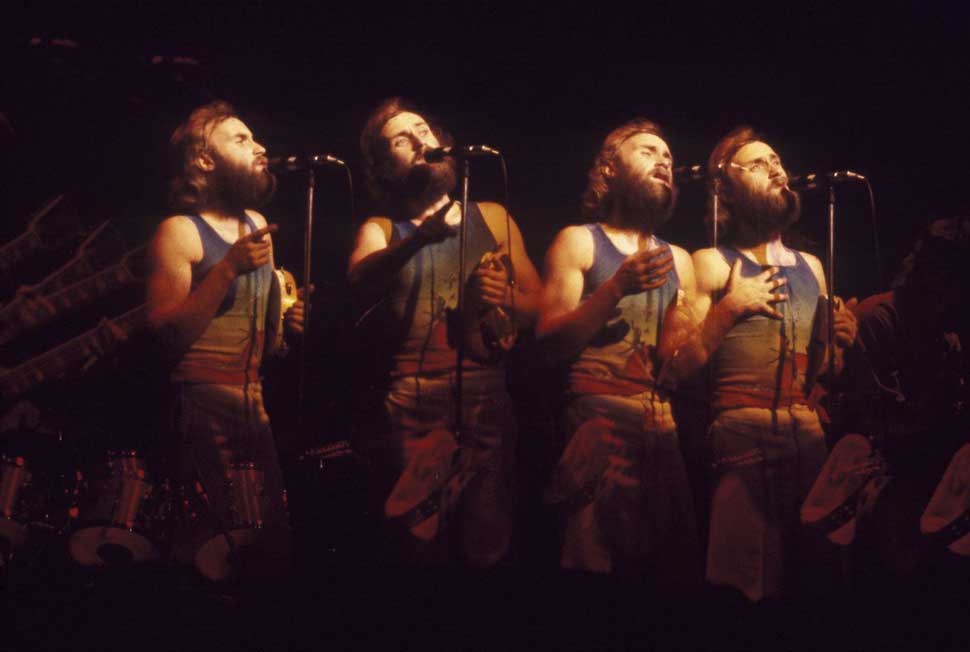
Can you remember the first gigs where you were front and centre, in March 1976?
“Vividly!” Collins laughs. “Canada, because it was always strong for us. London, Ontario was the first show, then Kitchener. For me it was: ‘What do I wear? What do I do?’ I had big shoes to fill. I had the goodwill of the audience, but not the security blanket of my drums. Y’know, I could sing, but could I talk? Once we’d got a couple of songs out of the way at the first show, I felt: ‘I can do this.’ But it took me years to take the microphone off the stand. It became my drum kit, to hide behind.”
Your cloak of invisibility?
“Yes. Taking the microphone off its stand was what singers did. I wasn’t ready for that.”
The vocal transition may have worked perfectly, but you were certainly a contrast to Peter Gabriel visually. He’d had such a theatrical persona, whereas you were the definition of unpretentious.
“It wasn’t something I thought about. I do remember saying: ‘Okay, I’ll give it a go, but don’t expect me to put on the costumes.’ Which is funny, as I was the one that had come from an acting background. It wasn’t a conscious decision to not do what Peter did, I just didn’t feel I could pull it off. So I became the guy next door. If you don’t put on costumes, you just stand there and sing. And that’s what I did.”
“In some respects that helped us,” adds Mike Rutherford. “You couldn’t carry on Peter’s mystique. I mean, it’s not in Phil’s nature. With his character on stage, lightening things between the darker songs, it helped the balance of the shows.”
After attending the band’s Hammersmith Odeon gig, Gabriel said: “I felt more at ease than I expected to. Except that I got some twitches during Supper’s Ready. It looked like someone else dressed up in my entrails.”
Collins has recalled: “Peter said: ‘You sing Supper’s Ready and Carpet Crawlers better than I do, but you’ll never sing them like I do.’ I know I sing it better than he does, but when he sings it it’s with more understanding.”
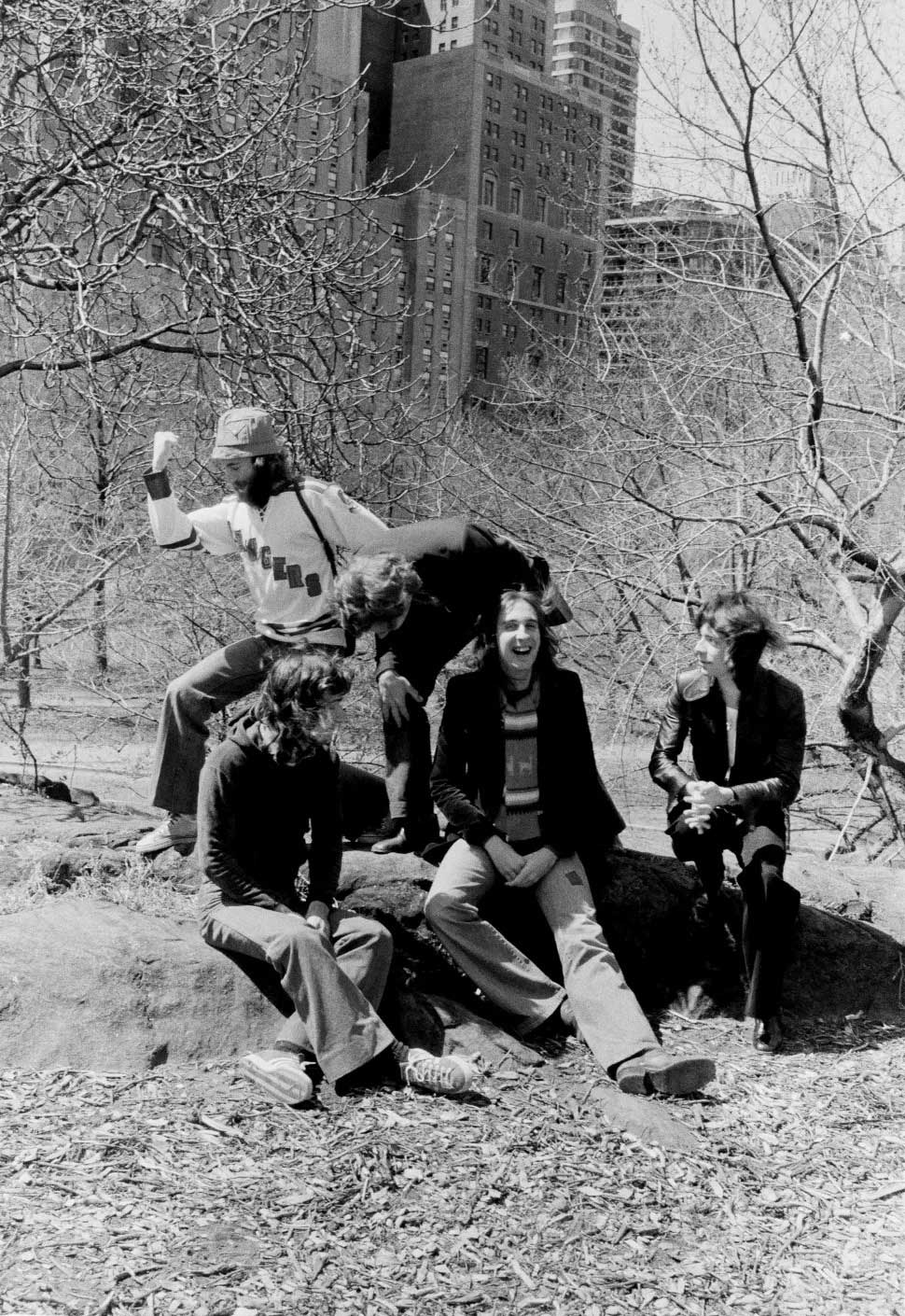
“We were lucky in a way,” remarks Tony Banks. “Despite what anybody might think of it now, The Lamb Lies Down, quite a difficult double album, sold less than [it’s predecessor] Selling England By The Pound. We were in debt. So we were able now [with A Trick Of The Tail] to come out with something more direct. Dance On A Volcano is a very arresting beginning to an album. It gets you in there. Then you have strong choruses like Ripples… It was a good place to be.”
“We’d started writing, and things just happened from the first day,” recalls Rutherford. “After two or three weeks we thought, this feels strong, feels good. It gave us the confidence to carry on. Phil singing happened in a very natural way, no forced pressure. And it wasn’t a whole new persona coming in. The audience liked that he was quite a character, but was one of us, one of them. We knew after half an hour in Canada that this was going to work. You don’t look for change, but when it happens it gives you a restart.”
Thus re-booted, the new Genesis saw A Trick Of The Tail – a winning, well-judged blend of yearning melodies (the title track, Ripples…), poignant narratives (Mad Man Moon), and mesmeric, velveteen sound-beds (Entangled) – sell well on both sides of the Atlantic. Left to their own devices, the quartet had got it very right. The next album, the melancholy Wind And Wuthering, consolidated the new line-up and sound, with tracks like One For The Vine, Your Own Special Way and Afterglow refracting the old, epic grandeur through accessible shapes.
The lyrics on both albums referenced a homeland both recognisable and mythologised – ‘a muddy pitch in Newcastle’, ‘dark and grey, an English film, the Wednesday play/We always watch the Queen on Christmas Day’ – which its residents love/hate. You could still escape into Genesis, but now you’d sometimes glimpse signposts from reality.
“It’s not one of my favourites”, Rutherford says of Wind And Wuthering. “It lacked balls, for me.”
“There’s a character about it,” offers Banks.
Steve Hackett decided it was his final Genesis album, and left the band as the live album, Seconds Out, was being mixed. “I didn’t leave because I was unhappy with the band’s music, I left because I was frustrated in my own ability to create a musical world of my own,” he told journalist David Buckley.
“Sometimes Steve would come in with stuff that we didn’t really like,” admits Collins.
“It was kind of weird, Steve’s leaving,” Rutherford says. “I don’t really know why he did. We were mixing the live album, and Phil passed him in Wardour Street. They nodded, said: ‘Hi. See you in a bit.’ Then Steve didn’t come in like he was meant to. It was an odd moment. A group needs a certain amount of communal energy to get a career on the road. You’ve got to get established before you do other projects outside it.
"Steve had made a move into solo work, which was fine, but he wanted to carry on with that. Not long after, we felt we had got established to the point where we could do solo stuff. So it came to him too early, I suppose. I took on the guitar role. I’m not a lead player of Steve’s calibre but, again, because we’re songwriting-driven, I was probably okay.”
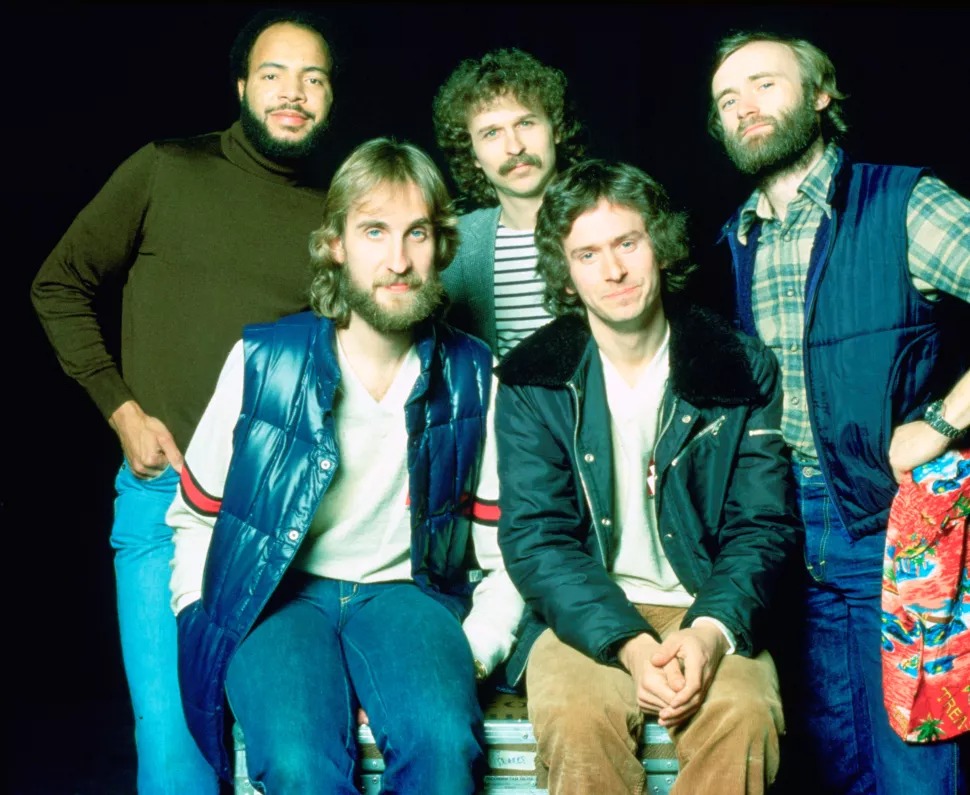
And then there were three…
“Records became very easy to make then,” says Banks. “Although on [the next album] And Then There Were Three I did feel the lack of a guitarist who was fluent, as Mike was still learning at that point. Steve had his own character, which the album missed.”
“I don’t think it’s great,” says Rutherford. Follow You Follow Me turned out rather well, though. A nice little pop song, but not too sugary. I don’t know why it works but it does.”
Released as a single in March 1978, Follow You Follow Me gave Genesis their first UK Top 10 hit, their breakthrough into regular singles radio play.
“That album coincided with my marriage breaking up,” Collins remembers, “so really the writing there went between Tony and Mike. I wrote a few lyrics. I was preoccupied with other parts of my life, nothing to do with music.”
With Genesis now officially hit-makers, the three members felt they could venture securely into solo projects. Soon Banks and Rutherford were releasing albums (Banks first, with A Curious Feeling in ’79, Rutherford with Smallcreep’s Day in ’80; he would also later launch Mike + The Mechanics in ’85), while Collins worked on a little side-project album called Face Value, which opened with an understated song called In The Air Tonight. The songs he wrote were inspired by his divorce, live drums were largely replaced with programmed ones, and he brought in a horn section.
The album, released in 1981, went on to sell five million in the US, and go five-times platinum in the UK and 10-times platinum in Canada. The ‘drummer’s solo project’ became, unexpectedly, an international phenomenon. The shape, scale and feel of Genesis would never be the same.
“The two things cross-fertilised a bit,” explains Banks. “The problem was that having briefly escaped from the feeling that we were Peter’s backing band, suddenly there we were: Phil’s backing band. But I thought, what the hell. It would’ve been very difficult if Phil – or Peter, anyone – had had that kind of success when we were 21, but by then we were more like 31 and it was easier to take. We just went, ah, okay. It changed a lot of things. Phil, in a sense, had been the junior member of the group. By the end of all that stuff everyone was very much equal. I think we all benefited from it. We did get very good at writing hit singles.”
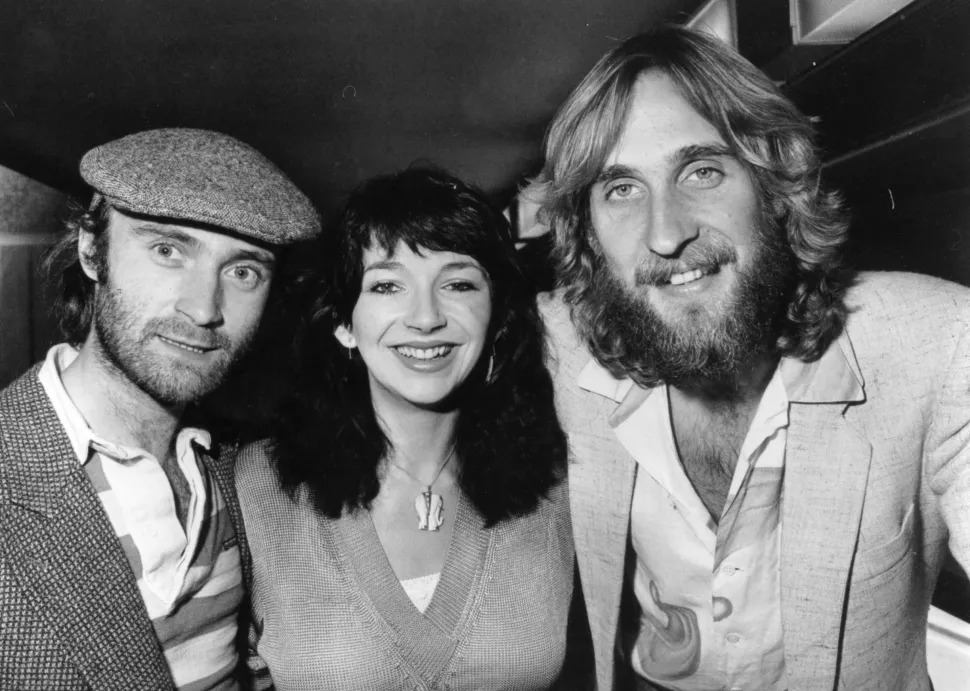
“We were one of the few bands who made it work,” Rutherford says of solo sabbaticals in general. “It probably kept us going a lot longer, because we had a great variety. After you’d been on your own, being responsible for a whole album, it made us appreciate each other. Because we’d been together since we were young men, there weren’t really egos within the band situation. Phil, having had huge solo success, came back to the band as it was before. He should be given more credit.”
Before 1980’s Duke gave Genesis their first No.1 album and Face Value made an unlikely superstar of Collins, there had been this awkward phenomenon called punk rock. It spat and roared that all the old established, indulgent dinosaurs must be swept away to make way for the new, three-minute, three-chord, all-rage anti-aesthetic.
The careers of many of Genesis’s peers suffered, never to fully recover, with musical proficiency labelled showy, and flights fantasy thrown of out with the bombastic bath water. Yet, somehow, Genesis survived again. In fact they grew bigger than ever. Further proof that in the peculiar case of this quietly strange band the normal rules do not apply. How did they avoid being razed to the ground?
“I think we were out of the country,” Rutherford answers blithely. “Because I don’t remember it happening. Of course, I knew it was going on, but I didn’t really feel it. Around ’76/’77 we did a huge tour, and then you don’t really follow England so intensely, or not as much as people who were here all the time. I was aware of it, and it was no bad thing, actually.”
Did it affect your thinking at all?
“By then we were too far down our own musical road. Also, we’d already rather simplified from the likes of Supper’s Ready to shorter songs. We’d made a big change, we’d moved along.”
“We’d adapted, become more straightforward, and that suited the times better,” says Banks. “It felt natural to us not to keep on doing complicated pieces and reprises and all the rest of it.”
“Being on tour such a lot,” says Collins, “we weren’t around to witness punk. We knew what was going on because we read the music papers, but didn’t feel too affected by it. I actually remember thinking, ‘Good – a lot of these bands I don’t like either will just disappear!’ I wasn’t a big fan of most of the bands who suffered anyway.”
Were you aware that you were suddenly proclaimed unfashionable?
“I think we were disliked by some, yes. But it’s like that John Cleese accountant sketch: ‘You’re perfectly boring, you’re perfectly normal, you’re perfectly suited to being an accountant.’ Cleese had an accountant’s meeting the following day, and suddenly realised this had been on television.
So he went to his accountant and said: ‘Did you see the show?’ ‘Oh yes,’ said the accountant. Cleese said: ‘Ah. I’m ever so sorry about that.’ The accountant said: ‘No, not at all. You see, I’m a chartered accountant.’ To me it was like: ‘Oh, they’re not talking about us, they’re talking about those virtuoso bands.’ We write songs, we’re not in that group. Although obviously a certain element of what we did was what they were trying to get rid of.”
As Duke showed, Genesis had done their own, voluntary curtailing and culling in time for the 80s. In fact what had originally been envisaged as a 30-minute suite of songs (including Duchess and hit single Turn It On Again) was separated into individual tracks. Meanwhile, Misunderstanding gave the band their first US Top 20 hit.
“I always say Duke is my favourite,” says Banks. “There’s something optimistic about that album, which I love. The way it starts. Bang! You’re in. That’s when we really gelled as a three-piece.”
“I was out with the mist with Duke,” says Collins, who made up for not being fully focused on its predecessor. “We rehearsed at my house while I was writing Face Value, too. We became more the band we used to be, writing stuff out of thin air, just from a guitar riff or a drum machine pattern or whatever. Working stuff up from scratch. And that became the way we continued. Because by that point I had a solo career.”
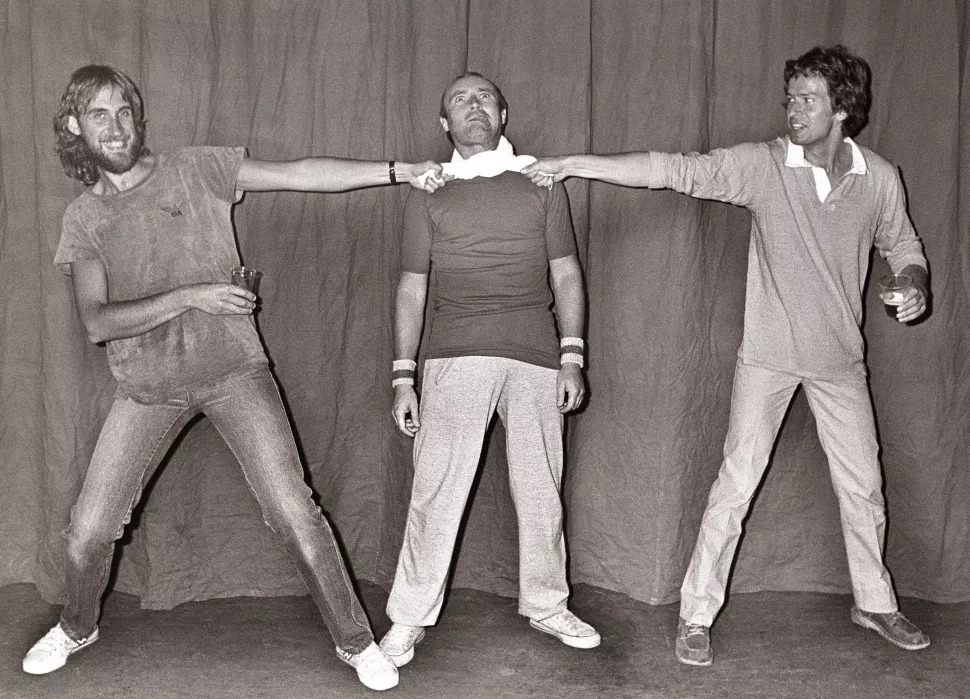
Indeed he did. After Duke, every subsequent Genesis album was perceived and judged differently. Phil Collins became one of the best-selling solo artists in the world, but continued to record and tour with Genesis until 1996, 16 years and four albums later. How did he manage to combine the two?
“Well, it’s what I did,” he shrugs. “By this time I was married for the second time and we didn’t have kids, although I had two from my first marriage and they came out on the road with us. On top of all this I got offered things where I couldn’t believe my luck. I’d be sitting at home and the phone would go and it’d be Robert Plant. I was living not far from Eric Clapton, and we became friends through John Martyn. Suddenly he calls me one day and asks me to produce his album. How could I refuse? I was being asked to play by the people I grew up listening to. I’d think: ‘I probably won’t get asked again,’ so…
“There was one year, ’87 I think, when…”
When Genesis became the first band to play four consecutive sold-out nights at Wembley Stadium?
“Yes. We had three weeks off after that tour and then I went on the road with Eric. And, you see, by the time we did a Genesis tour and went around the world and back, I’d feel I could do an album again. Or I’d do the same thing and tour with my album, and then it’d be time for a Genesis record.”
Did the lines between Phil Collins albums and Genesis albums ever get blurred?
“No. The way we’d developed, from Duke onwards, we all had outlets for our individual material. Rather than, say, Tony coming in and us learning his song the way he wanted us to play it, he’d do it as he wanted it done on his own album. Some of my things would never have had so much space if I’d put them in with Genesis. It’s a question of growing up and knowing what you want to do. And in the end I left the band after I’d done the album Both Sides, where I played absolutely everything. Because I thought: ‘I don’t know if I can go back now.’”
The end for Genesis wasn’t nigh yet, though. As if to show there were no hard feelings between frontmen old and new, in 1982 there was a one-off reunion performance with Gabriel and Hackett at a muddy Milton Keynes Bowl, under the moniker Six Of The Best. It was arranged (hastily) to raise funds for Gabriel’s WOMAD project, which was then struggling financially.
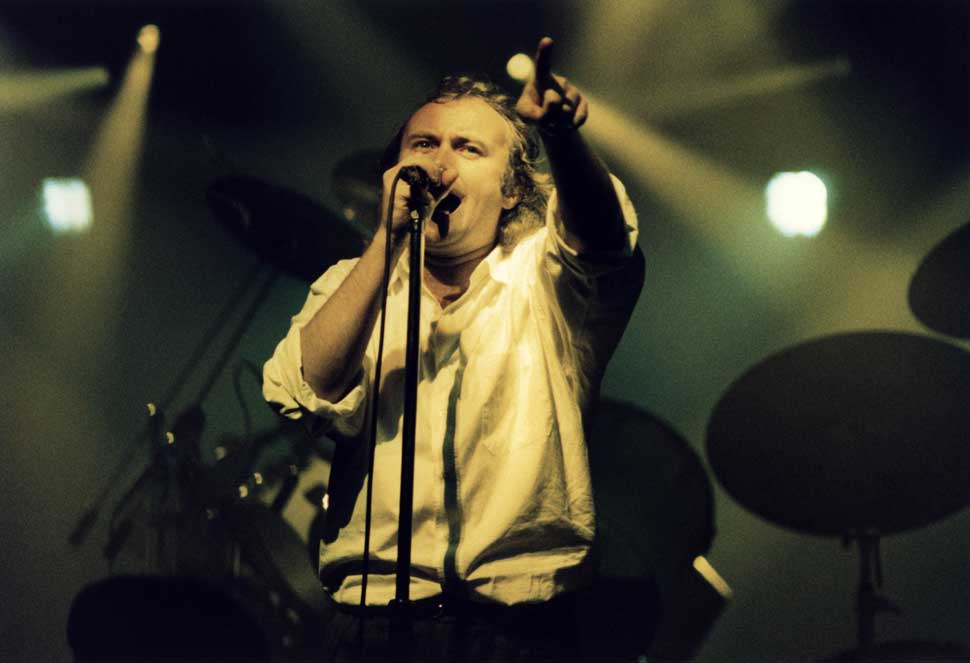
Karma thus ensured, Genesis, with Collins now (against all odds) a household name, spent the rest of the 80s growing absurdly big. Abacab (’81), Genesis (’83) and Invisible Touch (’86) outdid each other, before We Can’t Dance (’91) saw the final studio hurrah of the Collins/Banks/Rutherford line-up. The first of those, another UK No.1, was self-produced and another watershed. Recording it, they discarded an entire album’s worth of material as they thought they were becoming, in Rutherford’s words, “a caricature of ourselves”.
With evangelical new-wave-era zeal, they threw out any songs that sounded like anything they’d done before. It firmed up their move towards radio-friendly pop-meets-AOR, although the albums generally still featured concessions to longer-form structures. As Collins had done on Face Value, they used Earth, Wind & Fire’s horn section – an unthinkable move to fans of Genesis albums like, say, Nursery Cryme or The Lamb.
Even the album’s title was the polar opposite of the fantasies-and-fables days of yore. Rutherford told an American radio show: “There were three bits of music in Abacab, and we referred to them as Section A, Section B and Section C. At different times, they were in different order… and at one point it spelled ‘ABACAB’. On the final version, it wasn’t that at all, it’s more like ‘ACCAABBAAC’.”
Rolling Stone magazine praised the band for dropping their “ivory-tower artistry” and embracing “highly rhythmic interplay” and pop hooks, and compared Genesis to The Police and XTC. “Truly modern art rock,” said another review.
Thus the new incarnation was encouraged and confirmed. The music became increasingly clinical, ruthless, effective, 80s. Topical issues were sometimes touched on, and the dreamy meanderings of the past were gone. Genesis (the band members all refer to it as ‘the Mama album’) included Mama (concerning an obsession with a prostitute, and inspired by David Niven’s autobiography), That’s All and Home By The Sea, and was another No.1.
Invisible Touch was by far the biggest album of their career, selling more than 15 million copies worldwide and birthing no less than five US Top 5 hits, with the title track giving them their only No.1 single.
In American Psycho, the serial killer Patrick Bateman calls it their “undisputed masterpiece. It’s an epic meditation on intangibility. It deepens and enriches the meaning of the preceding three albums… Listen to the brilliant ensemble playing… you can practically hear every nuance of every instrument.” Satirist or not, he wasn’t their worst critic. As Collins has said:“In the later years there were people coming to our concerts who didn’t know I played drums.”
After a hiatus, Genesis reconvened in 1991 for their fourteenth – and what would be their final studio album with Collins – We Can’t Dance. “For me,” says the singer, “we sounded really good on that album.” Inevitably it was huge in both the UK and the US. The trio stress again that this wasn’t a case of chart-magnet Collins imposing hits upon the others.
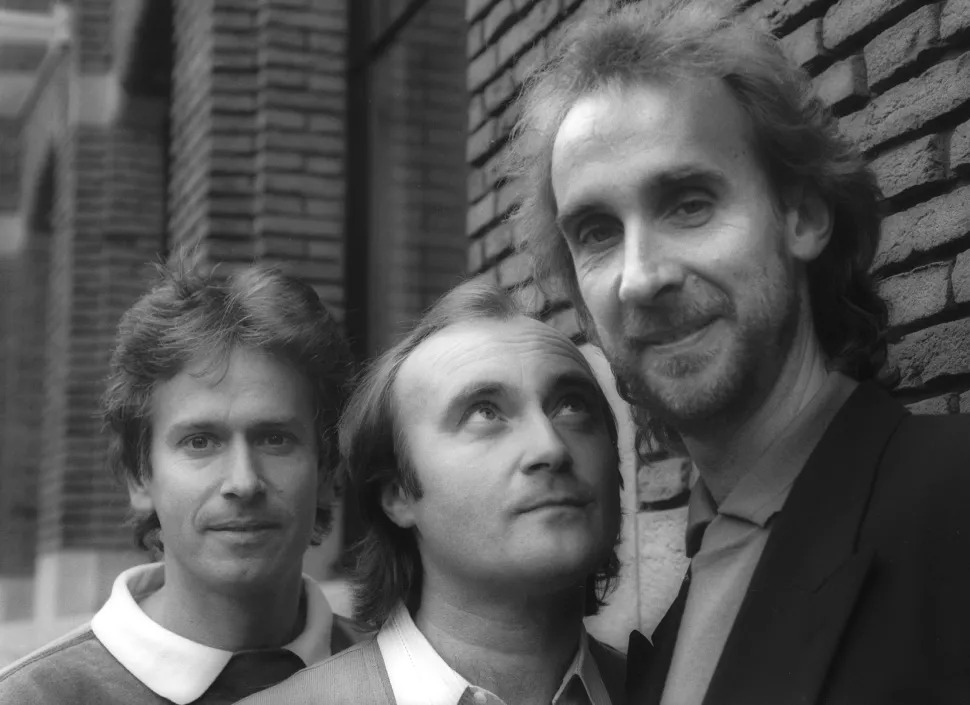
“I can understand why people might assume so,” Banks says, “but it really did come from all three of us. The emphasis changed.
“Once, maybe, Steve and I had wanted to steer it a little more left-field, but after Steve left I lost that bit; I was quite happy. I’d come into the business to write pop songs. When we got it right, when it all fitted together, like on Land Of Confusion I’d feel a sense of satisfaction. And we were still able to do more ambitious pieces, like or Tonight Tonight Tonight. The live show was still perhaps heavier than the records.”
Genesis’s early-90s live album The Way We Walk divided the tracks into separate volumes: ‘the shorts’ and ‘the longs’. It was all a far cry from the trippy days of ‘Me, I’m just a lawnmower, you can tell me by the way I walk…’
When Phil Collins did cut the cord, it was down to geographical, not musical, differences. He recalls: “We met at [manager] Tony Smith’s house and sat round the kitchen table, and I said: ‘Well, I gotta go, guys.’ And they said: ‘Okay, fair enough. We’re surprised you stayed as long as you did.’ Which I thought was fantastic. When they actually announced it, they said: ‘After 25 years, we’ve decided he’s not the right guy.’ They had a wonderful attitude towards the whole thing. Then they said they were going to carry on, and I was pleased as punch, because the music touches so many people who have no control over it.”
It was the end of an era. Did you feel in any way sentimental about it?
“I felt some relief,” says Collins. “You do get into a situation where you’re a slave to the band. ‘Slave’ is probably the wrong word.
“I remember a conversation after my first marriage broke up, and Tony and Mike said: ‘Well if you’d just told us, we’d have cancelled some things.’ And I wouldn’t have thought of that! Because this was our job. I didn’t want to let the guys down. Or the roadies. At the same time, my life had pulled me to Switzerland, and I didn’t see at the time how we could carry on. I was becoming far more independent. The more you find yourself, the harder it becomes to sing other people’s thoughts.”
And you’d had so much validation as a writer at that stage of your career.
“But I’ve always erred on the insecure side, I must admit. That might sound difficult to believe, because I’ve been very lucky with the success rate of what I’ve done. Still, if there’s 100 people in the room and one guy doesn’t like it, I’m more interested in why that guy doesn’t like it than why the other 99 do. So I end up whipping and questioning myself. But I’ve had a charmed life, which Genesis has been a huge part of. We wouldn’t be sitting here talking if it wasn’t for Genesis.”
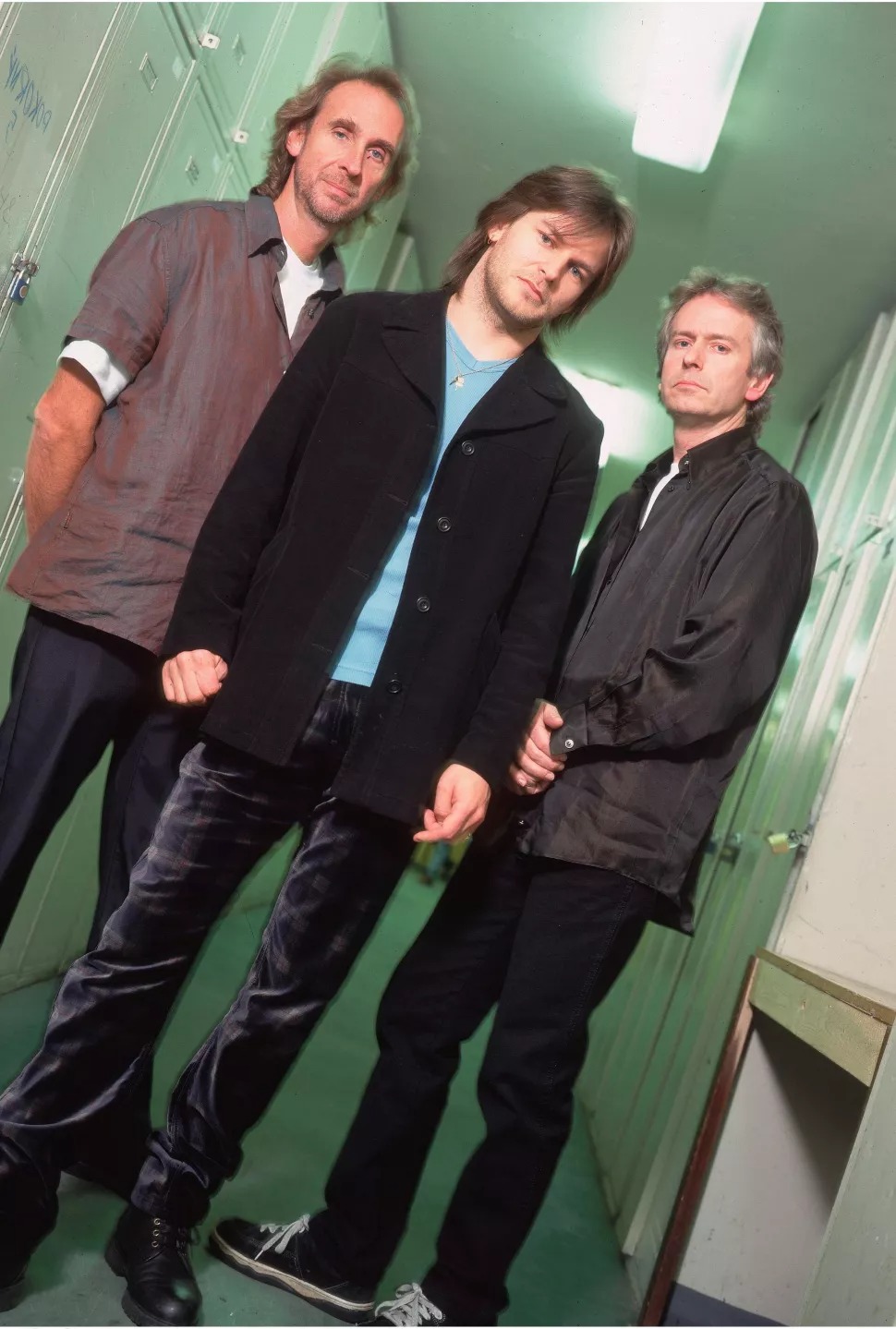
And so the glory years wound down. There was nothing left to prove, yet Banks and Rutherford brought in Ray Wilson (formerly of Stiltskin) as vocalist, along with other musicians, and released 1997’s Calling All Stations album. Sales were, by Genesis standards, disappointing. And while one imagines nothing would irk Banks and Rutherford more than it being described as a footnote to the Genesis saga, that’s what it was.
“It didn’t do badly, but not as well as one hoped, so it has a slightly tainted feeling with me,” says Banks. “And having to cancel an American tour was frustrating. The audiences that came to shows enjoyed it, but it was difficult to persuade them to come.”
Over the next decade, Genesis reconvened only for various archive box-set launches. In 1999 the ‘classic’ line-up of Collins, Banks, Rutherford, Gabriel and Hackett re-recorded Carpet Crawlers for a compilation. That might have been that. But in 2007 there came the Turn It On Again reunion tour.
At first the idea had been to gather the 70s line-up with Gabriel and Hackett to perform The Lamb Lies Down On Broadway. When Gabriel couldn’t commit, Collins, Banks and Rutherford thought it would be more appropriate to bring back Chester Thompson and Daryl Stuermer (who, respectively, had played drums and guitar/bass live with Genesis after Gabriel and Hackett left, right up until Collins left) from the later era. Hackett had no problem with this.
“Peter was actually the one who’d suggested doing The Lamb,” reveals Banks. “We gave that serious thought, because we’d assumed he’d be the difficult one. But then he did become the difficult one. And I can’t blame him. Did he really want to go back into a situation where we all have an opinion? Phil is obviously more used to it, we have an easy relationship.
“It was a lovely tour to do. I enjoyed it. I was sad we didn’t play more in England. We didn’t know where we stood, to be honest. The group always got slightly strange press here, so we played it fairly safe, and played a lot in Germany, where we knew they liked us. It was a very ambitious show, and had to be financed that way.”
“We weren’t sure how it’d sell in England,” agrees Rutherford. “Of course, we should have done more nights at Twickenham. That was a shame. We made a mistake there.”
A free open-air concert at Rome’s historic Circo Massimo drew an immense crowd, estimated at around half-a-million.
“It was a pretty bullet-proof show, even though torrential rain followed us around,” Collins says of that tour. “It sounds corny, but it was fantastic to see parents telling their teenage kids: ‘Now this is a band!’ The fact that it was sold-out everywhere told us we were doing something that people still like to hear and don’t see much of any more. It was hard work, to try to play like you did 30 years ago, on some things. And, basically, that was the tour that fucked me up as a player. I did my neck and my back and my arm. Somewhere, doing the drum duet, something waved a white flag and just gave in. And now I can’t play any more.”
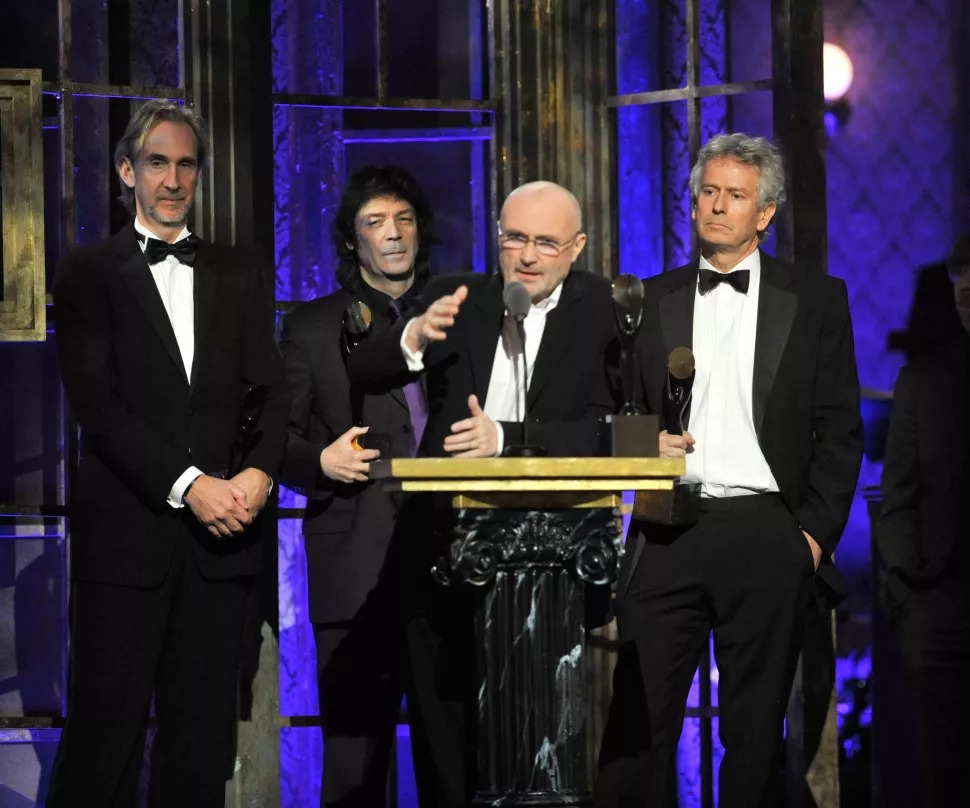
You’re definitely ruled out for good?
“Yes. I’m out of the whole thing. It’s fun to talk about, but I’ve got my kids, and I’ve written a book about Texan history and the Alamo. No, I can’t play now. A year ago, at the Prince’s Trust thing, I did Crossroads with Eric [Clapton] and I just couldn’t hold the sticks well enough. Really, I’ve done it all my life and it’s no surprise I’ve run out of air miles. I remember on stage in LA, at the end of the last show, I told the guys, in front of the audience, that I loved them. It was my way of saying I can’t do any more. We’re great friends, and that’s what’s so nice in the end, when you’ve been with people for such a long time. It’s been a great journey.”
Genesis were inducted into the Rock And Roll Hall Of Fame in 2010 (Collins, Banks, Rutherford and Hackett attended, Gabriel was in rehearsals for a solo tour). Gabriel and Hackett both released albums in 2011. Rutherford maintains his Mechanics, but “of course I miss it. It was a powerful machine when that band kicked in. Being on stage was the most wonderful feeling.” Banks loves writing, “so if the group’s not available, I do it some other way”. Collins has a place in history, along with Paul McCartney and Michael Jackson, as the only musicians ever to sell more than 100 million albums as a solo act and another 100 million as a member of a band.
“What’s wrong with this picture?” he laughs. “Spot the odd one out. I had no idea until Going Back, my last album, came out. And of course that will always stay that way, because records don’t sell those sort of figures any more.”
Does it bother Genesis that they’ve never had the acclaim from the gatekeepers of criticism and cool that they must feel they’ve earned? (Particularly when you consider that there are more than 50 Genesis tribute bands in existence.)
“It’s not a big thing, really,” says Banks. “I am surprised, though, that we’ve slipped into this position – we had a lot of success at one point. No one minds being adored, do they? We didn’t get press, we didn’t get awards. We slip through the cracks somehow. The problem may be, a little, that Phil’s star has done funny things, because of his solo career and life. It’s perhaps affected how people perceive the group. Some people wouldn’t know which were Phil tracks and which were late-Genesis tracks. But those earlier albums are starting to be thought of a little more kindly.
“I can’t complain. I’ve had a fantastic career. And I can be on the Tube, go anywhere, live a totally normal life, so I think I get the best of both worlds. Besides,” he adds, “never being cool meant we never had the problem of suddenly not being cool; we’ve always been just not very cool.”
“Genesis was always a little ahead of the times,” reckons Rutherford. “We just kept changing. And that was good for us, but maybe not for the Grammys. I heard someone refer to Take That as a ‘heritage band’ the other day. I thought: everything’s relative. Also, because of the music’s intensity, people always saw us as rather serious. Actually we had the most amazing fun, a huge laugh, living our lives.”
“We started to get good reviews on the reunion tour,” recollects Collins. “I’d forgotten what that was like! Because, you know, I’ve lived under this umbrella of abuse for many years now. But it feels like a few slates are being wiped clean, credit being given where due. And the body of work will be remembered, not what someone felt at the time. Forty years of Genesis – that’s a lot of music. Bands don’t last that long now because of the media environment. Everything burns out quicker.
“My younger kids have just discovered what dad did. They listen to Genesis in the car. And it’s only when they listen to it that I do. It reminds me of the van breaking down on the way to gigs. Obviously that was in the early days, and not in the last 30 years. It was all experience and it’s all worth remembering."
The original version of this feature appeared in Classic Rock 168, in March 2012. Genesis's Last Domino? tour will arrive in The US on November 15 and returns to Europe in March 2022. Tickets are on sale now.
